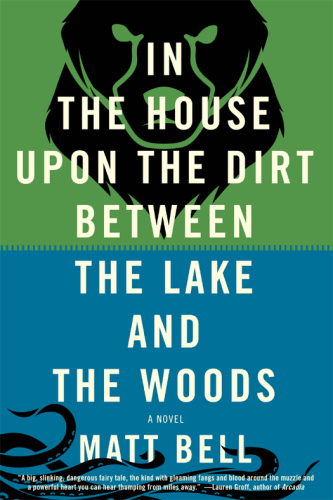
In the House Upon the Dirt Between the Lake and the Woods
کتاب های مرتبط
- اطلاعات
- نقد و بررسی
- دیدگاه کاربران
نقد و بررسی

March 11, 2013
This debut novel from up-and-coming Bell (Cataclysm Baby) is a dark, intriguingly odd fable about what it means to be a father. The narrator (no character is given a proper name) takes his new bride to a secluded house in an area populated only by wildlife, including an overly symbolic she-bear. The carefully wrought prose takes its cues from magical realism: “Beneath the unscrolling story of new sun and stars and then-lonely moon, began to sing some new possessions” to furnish their rustic abode. Things get stranger still when the man consumes his still-born son’s body. The couple struggles to conceive again, until one day the woman brings home a young child dubbed “the foundling.” The man can’t accept the boy and, haunted by his dead child’s ghost, descends into madness. The sketchy narrative and characters, however, interest Bell less than large-scale themes: the oedipal competition between a father and son for a mother’s love; threatened masculinity; and, more elliptically, man’s impact on the environment. This challenging, boldly experimental attempt at myth-building may resonate with equally ambitious readers, but offers fewer rewards to those looking for narrative pleasures. Agent: Kirby Kim, William Morris Endeavor.

May 1, 2013
A folkloric, allegorical tale of modern marriage, complete with shape-shifting, secret passageways and trials by fire. The couple in this debut novel by Bell (How They Were Found: Stories, 2010) isn't named, but the author drops strong hints that we should think of them as Adam and Eve. That's not just because we know the man's name is two syllables and that the woman's is three letters and palindromic, but because they are so clearly archetypes of babes in the wilderness. The two left the city for the woods after marrying, but miscarriage after miscarriage has undone their hopes for a family. All the man is left with is a "fingerling"--a fetuslike being that occupies his body and intones the occasional bit of devilish guidance. After the woman arrives with a "foundling"--actually a bear cub morphed to look like a child--the couple becomes increasingly stressed and divided by their unnatural state of being. That's one way to look at it, anyhow: Bell cultivates a loose sense of unreality that allows the reader to make all sorts of metaphorical projections. But the novel is also meticulously designed, with a particular focus on the musicality of its sentences, and the narrative's general arc of adventure and discovery is relatively conventional. In time, the man will lose his wife, tussle aboveground with a bear and underwater with a squid, and discover an underworld that's a replica of the woodsy world he's left. Some of Bell's heavily symbolic adventuring grows too repetitive to sustain a full-length novel--there's a reason Jorge Borges stuck with short stories--but there's an undeniably heartfelt tone to this tale that transcends its unusual cast. As the male character's path to redemption leaves his body increasingly ravaged, Bell's book becomes an unflinching portrait of the struggle to keep a family intact.
COPYRIGHT(2013) Kirkus Reviews, ALL RIGHTS RESERVED.

Starred review from February 15, 2013
Here Bell (creative writing, Northern Michigan Univ.; How They Were Found) puts the fable in fabulism. This spare, devastating novel peels back layers of geography, modernity, and even proper nouns. Its characters--husband and wife, fingerling and foundling, bear and squid--share in their universality something with the woodsmen and witches and stepchildren of fairy tales past. This story follows a husband and wife as they arrive, freshly married, in a wilderness and try to start a family. The wife is endowed with great powers of creation; she can sing objects, and even whole worlds, into being. When their attempts to conceive result in miscarriage, she resorts to other means to provide their family with offspring, while her husband is haunted by the ghost of their unborn son. Their grief divides them, and they must separately grapple with the bear who rules their woods and the squid who dwells in their lake, with labyrinths of memory, and with the anger of children both injured and unrecalled. VERDICT Bell's story is as beautiful as it is ruinous. A tragedy of fantastic proportions, the book's musical, often idiosyncratic prose will carry its readers into an unfamiliar but unforgettable world. [For more on Bell and this title, see the Editors' Picks feature on page 34 and a Q&A with the author on page 96.--Ed.]--Molly McArdle, Library Journal
Copyright 2013 Library Journal, LLC Used with permission.

June 1, 2013
In his charmingly bizarre and disturbing debut novel, Bell (How They Were Found, 2010) paints an unorthodox portrait of a troubled marriage. An unnamed couple, recently wed, move to a remote woodland home to start a family amid nature's serenity. The husband, once a fisherman by trade, labors with his hands. The wife creates things with her voice, singing physical objects into existence and altering nature's course. Meanwhile, a mysterious bear lords over the surrounding woods. When the wife's first pregnancy results in miscarriage, the husband covertly swallows the aborted fetus, which whispers cryptic commands and dark secrets to him, driving him to resent his equally enigmatic wife for her hope that she will someday give birth. They grow increasingly distant as she miscarries time and again, until at last she conceives a child that only drives the couple even further apart. Bell finds whimsy in despair and reality in the absurd in this absorbingly virtuosic near fairy tale about marital struggle and personal reclamation. The result is a novel of catastrophic beauty and staggering originality.(Reprinted with permission of Booklist, copyright 2013, American Library Association.)

























دیدگاه کاربران